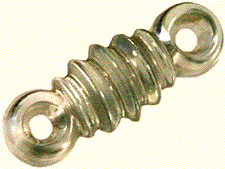|
After I added
these vintage pyrex antenna insulators to my 40 meter dipole
I began to hear weird and exotic DX signals in my receiver.
But how could this be? Was it my imagination? Or was
it....
|

THE
STRANGE POWER OF THE
GLASS
DOOBIES
(and other
mysteries)
WHAT REALLY HAPPENED ON THE
TITANIC
The
fantastic power of the doobies is known to but a select few. Legend
has it that the most sought-after examples were RCA president
David Sarnoff's personal set of jade-green pyrex insulators,
which were said not only to have been responsible for his receiving
the TITANIC's distress signals, but to have pulled in the
squawkings of distant galaxies!
Not so on the ill-fated
TITANIC. The 6-wire, flat-top antenna installed by the Marconi
Company had hard rubber insulators at its end junctions. Wireless
operator Harold Bride begged to be allowed to replace these
with glass or porcelain type insulators, but both Marconi and White
Star Lines management refused, stating "we find no particular
advantage to modifying the present system".
On April 15,1912 as the
Titanic was sinking, Bride desperately tapped out his distress call
for several long minutes before the first reply was heard. "UR SIGS
WEAK OM" answered the vessel Carpathia, "TRY USNG GLASS
INSLTRS". Back in New York, young David Sarnoff listened in
fascination as the signals poured into his headphones.
In light of the subsequent
disaster and loss of life, shipboard and coastal wireless
installations promptly replaced exisiting rubber and wood insulators
with glass or porcelain ones. In radioman's slang, these new antenna
insulators were called "doobies".
I FIRST ENCOUNTER THEM
You
won't find these at any Radio Shack store. I first observed their
otherworldy properties after finding them at a flea market table in
Derry, New Hampshire many years ago, quite by accident. I
purchased two of them for 50 cents, and set them to work on a
40-meter dipole made from hard-drawn copper wire that same day. My
aged Hammarlund Super Pro fairly leaped to life. Signals began
to drift in from the Artic Circle to the Caspian Sea! My speaker
thudded with bleeps and groans, the cacaphonic honks and tweets of
legions of ham operators pounding telegraph keys in far-flung lands!
That night, the old Super Pro
glimmered in the darkness, its twenty-odd tubes thumping with the
barrage of microvolts pulsing through their circuits. I found that I
typically enjoyed up to 3db gain in received signals. Had I
run across an odd temperature inversion, sunspot surge, solar flare,
or other temporary anomaly of ionospheric propagation? No, by God --
it was the doobies!
LOST AND FOUND AGAIN
When
it was time to move, I packed them away, thinking I'd save them for
some future day when they'd serve as part of the ultimate antenna
system. Years passed. Boxes were shuffled about. When I next went to
look for them, they'd vanished. Over the course of several moves
they'd somehow been misplaced. I searched high and low, to no avail.
I resigned myself to the fact that they were indeed gone
forever.
But the mystical power of the
doobies would draw me to them anew. Just last year, I ran across a
notice on the Internet for a small ham radio flea market to be held
in -- of all places -- Derry, New Hampshire! Something told me that
this was not mere chance. I begged Hank, my friend in New
England, to go there in search of these elusive talismans. After much
persuasion, exhortation, and outright threats, he
relented.
On that chilly Saturday in
October, Hank drove through torrential rains and hubcap-deep mud to
arrive at a centuries-old Elks lodge nestled among the pines. In the
basement, a handful of damp figures milled among worn-out radio gear.
Hank searched the sparse tables for signs of insulators, but none
appeared. Finally, as he was about to leave, he spotted an old
gentleman hacking a throatful of phlegm behind a card table in the
dank cellar. He approached him and asked " You don't by any chance
have any glass antenna insulators?". With great difficulty, the old
man produced a crumpled box from beneath his table. "How many of the
dang things do ye want?" he wheezed.
There, before Hank's eyes were
the fabled pyrex insulators of legend in their original boxes! He
quickly negotiated for four of them at $5 each. "Ayep. I almost
didn't come out heah this morning," added the man, "c'ept I knew I
had to sell off these things before I die, which'd be any day
now".

And
so, once again, the sounds of faraway lands burble and burp from my
speaker. No matter how weak, or how distant, there's nary a signal
that can't be heard by my fashionable Japanese transceiver. Because
tonight, out at the ends of my dipole antenna, a pair of pristine,
pyrex doobies glint in the moonlight.
(If you think this story is
a bunch of hooey, check THIS
out)


